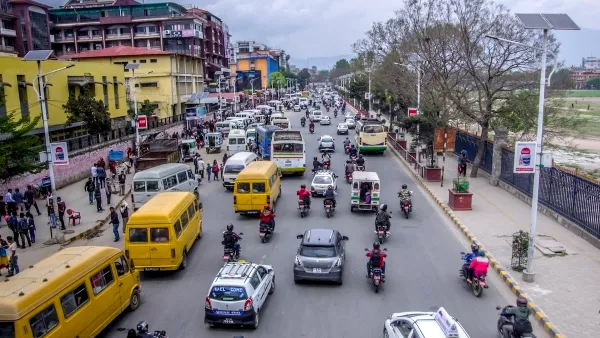The day after the number of signatories to the Paris Climate Accord met its threshold for implementation, the international community agreed to tackle growing emissions from aviation, which was not covered by the Paris agreement.

"Governments from more than 190 countries on [Oct. 6] adopted a measure that for the first time will reduce the climate impact of international jet travel," reports Henry Fountain, science reporter for The New York Times.
The aviation plan, the product of years of negotiations, was approved by acclamation at a meeting of the International Civil Aviation Organization, or I.C.A.O., in Montreal.
Leaders hailed the accord, which will take effect in 2021, as a major step in reducing the environmental impact of international aviation, which is currently responsible for about 2 percent of worldwide emissions of greenhouse gases.
The plan, known as the Carbon Offsetting and Reduction Scheme for International Aviation (CORSIA), "is designed to complement the basket of mitigation measures the air transport community is already pursuing to reduce CO2 emissions from international aviation," notes the ICAO press release.
Implementation of the CORSIA will begin with a pilot phase from 2021 through 2023, followed by a first phase, from 2024 through 2026. Participation in both of these early stages will be voluntary and the next phase from 2027 to 2035 would see all States on board.
"Under the program, airlines will buy credits to offset emissions from individual flights," adds Fountain.
The credits will come from alternative energy installations, forest conservation programs and other projects that prevent some amount of greenhouse gas emissions.
JetBlue has already agreed to one of the largest purchases of renewable jet fuel in aviation history to lower its carbon footprint.
On Oct. 5, the number of nations that had approved the Paris Climate Accord was approved by nations responsible for 55 percent of global carbon emissions, meeting the threshold for the agreement to take effect next month.
FULL STORY: Over 190 Countries Adopt Plan to Offset Air Travel Emissions

Planetizen Federal Action Tracker
A weekly monitor of how Trump’s orders and actions are impacting planners and planning in America.

Vehicle-related Deaths Drop 29% in Richmond, VA
The seventh year of the city's Vision Zero strategy also cut the number of people killed in alcohol-related crashes by half.

As Trump Phases Out FEMA, Is It Time to Flee the Floodplains?
With less federal funding available for disaster relief efforts, the need to relocate at-risk communities is more urgent than ever.

LA Transit Ridership Plummets Amidst ICE Raids
LA Metro’s bus and rail lines are seeing up to 15 percent lower ridership in the wake of violent immigration arrests.

A New Texas Neighborhood is Powered by Geothermal Energy
The 7,500-home development claims to be Austin’s ‘first zero energy planned community.’

Data: In Rural America, Mobile Homes are Heat Traps
Extreme heat is often viewed as an urban problem, but rural communities face their own unique risks.
Urban Design for Planners 1: Software Tools
This six-course series explores essential urban design concepts using open source software and equips planners with the tools they need to participate fully in the urban design process.
Planning for Universal Design
Learn the tools for implementing Universal Design in planning regulations.
Heyer Gruel & Associates PA
JM Goldson LLC
Custer County Colorado
City of Camden Redevelopment Agency
City of Astoria
Transportation Research & Education Center (TREC) at Portland State University
Camden Redevelopment Agency
City of Claremont
Municipality of Princeton (NJ)





























